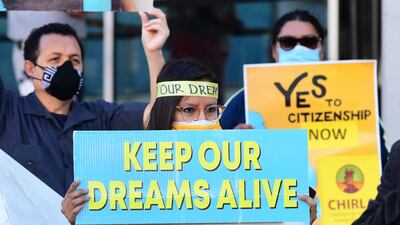US President Joe Biden's administration on Thursday proposed reversing a rule that denies green cards to applicants who receive certain government benefits, one of former president Donald Trump's signature moves to limit legal immigration.
The administration stopped applying the more expansive Trump-era limits in March, making the announcement more of a formality to insulate it from legal challenges.
Its publication in the Federal Register in the coming days will trigger a 60-day period for public comment, followed by a final version.
While the proposal has no immediate impact, it is an important step towards undoing Mr Trump's version of the “public charge” rule, as Mr Biden promised during his campaign.
Homeland Security Secretary Alejandro Mayorkas said the Trump rule was “not consistent with our nation's values”.
“Under this proposed rule, we will return to the historical understanding of the term ‘public charge’ and individuals will not be penalised for choosing to access the health benefits and other supplemental government services available to them,” Mr Mayorkas said in a statement.
The Biden administration's revisions largely restore rules that had been in place since 1999, which, among other things, do not consider use of noncash benefits like food stamps, health services and transport vouchers when determining green card eligibility.
Mr Trump made his intentions clear during his first year in office, but the rule didn't take until 2020 due largely to legal challenges and procedural requirements.
Still, Homeland Security said on Thursday that it had “chilling effects” by causing people to quit or decline to enrol for benefits they were eligible to receive, fearing their applications to become legal permanent residents could be derailed.
The government denied green cards to only three people under Mr Trump's rule, whose applications were later reopened and approved, Homeland Security said in its 291-page proposal, demonstrating its limited reach.
The fears it generated caused the biggest impact, scaring people away from enrolling in benefit programmes even if they were eligible, said Jessica Bolter, associate analyst for immigration policy at the Migration Policy Institute.
Her organisation found that enrolment for welfare assistance through the Temporary Assistance for Needy Families programme, food stamps and Medicaid fell twice as fast in households with at least one noncitizen than those made up entirely of citizens from 2016 to 2019, based on Census data.
The Biden administration's move was cheered by immigration advocates, many of whom have had a strained relationship with the White House over sweeping rules that prohibit many migrants from seeking asylum at the border.
Krish O’Mara Vignarajah, president of Lutheran Immigration and Refugee Services, tweeted that it was an “important departure from the Trump administration’s previous weaponisation of the public charge rule.”
The proposal may still face legal challenges. Texas and other states have in the past sought to stop Mr Biden from undoing Mr Trump's immigration policies.









